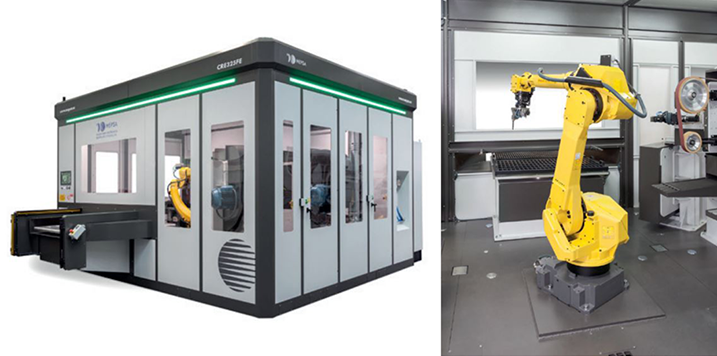 26 January, 2023
26 January, 2023MEPSA, a company which has over 35 years of experience in automating sanding and polishing processes for industry, with the support of FANUC, a Japanese firm specialising in industrial automation, took on the challenge of integrating additional processes into the manufacture of aluminium handles and fittings. The result is a cell capable of performing several operations such as sanding, polishing and brushing surfaces, as well as machining and screwing the fixing drill on window handles.
Previously, the sanding and polishing steps were performed manually in different stages, involving several workers in the process, which was time consuming and labour intensive. Surface finishing processes require highly experienced labour and the end quality of the product finish can vary depending on worker skills.
The reasons for this are usually:
- In the case of polishing, the force applied to the product and the amount of paste applied to the disc are key
- In the case of brushing, the key factors are the force and the trajectory of the part with respect to the disc.
These characteristics of the aluminium handles and fittings manufacturing process make automation a necessity.
Automation of surface finishing
In technical terms, the most significant challenge in automating surface finishing is maintaining work conditions consistent throughout the useful life of the consumables, both for the cotton discs and the abrasive discs used in brushing, since these wear down over time. Over the years, MEPSA has developed and perfected correction and compensation systems and mechanisms to maintain the parameters of the process stable and ensure a consistent quality of finish, and now they present the CRE 325 FE.
MEPSA has developed a stand-alone cell that brings together all the necessary elements and has a built-in FANUC M-710ic/50 robot, a specially designed automatic pincer, a loading device comprised of a highly autonomous double rotation palletising system, three sanding units, two units for disc polishing or brushing, and an additional station equipped to drill and screw in the handles. All of this with the connections built into the centralised vacuuming systems to filter out particle emissions.
The FANUC M-710ic/50 robotic arm performs the full cycle of the process, i.e. picking in the palletising system and detecting the part clasped in the pincer, measuring and redirecting it to conduct the sanding, polishing, brushing, drilling and screwing processes. The cell’s efficiency lies in its high production capacity thanks to the speed and precision of the FANUC M-710ic/50 robot, which communicates with the PLC, obtaining and applying the trajectory corrections and offsets indicated by a specific software in real time.
As a result, the palletising system can take loads of up to 400 handles, enabling enormous working autonomy. The sanding units, furthermore, offer a wide variety of configurations. In this project, the sanding units have been configured in various grains in order to achieve a perfect geometry with the required surface roughness and sanding the entire product accordingly.
Moreover, the integrated offset system corrects for wear and tear of the sanding strip in order to stabilise the process and ensure consistent quality. The sanding and brushing units can use a variety of disc sizes and types to achieve the desired finish. The disc wear offset system measures the polishing pressure and corrects the robot’s trajectory accordingly, part by part, to ensure consistent quality.
Lastly, the paste application system, which uses high-precision guns, enables uniform application and is fully adjustable to the necessary polishing paste quantity. This optimises consumption and minimises waste, both of parts and in the cell. All of this cuts down on manufacturing time, reduces energy consumption and leads to a better quality of product finish.
Minimising energy consumption is precisely one of the key challenges in automated brushing and polishing processes. The cell developed by MEPSA features devices such as the electricity and compressed air flow meter, as well as automatic valves to turn particle vacuuming on and off, which helps optimise consumption.
In summary, this project brings together various operations to simplify the flow of parts, reduce manufacturing time and labour used, and guarantee manufacturing volumes.
Thanks to this solution, production has been increased, stable and consistent product finish quality is guaranteed, and energy and consumables costs have been reduced by 30%.
Subscribe to our newsletter. Just insert your e-mail and you will receive the latest news.